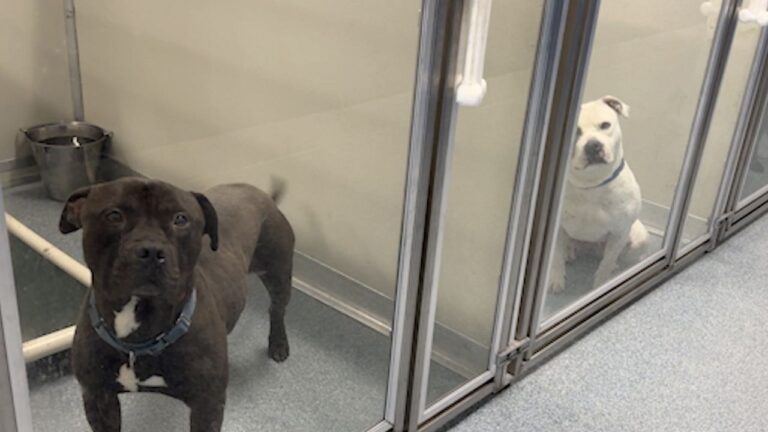Buying pets such as cats, dogs and rabbits at mall pet stores will soon be a thing of the past under a new state law that bans the sale of animals in retail pet stores.
The law, which goes into effect near the end of the year, is expected to have a major impact on pet stores across New York.
Bradford Green loves adopting dogs from shelters. There he got his two pit mixes, Clover and Sage.
“This is what I want to do to help dogs who are in shelters and have been heartbroken,” Green said.
What you need to know
- The law that goes into effect Dec. 15 will ban the sale of dogs, cats and rabbits by retail pet stores.
- Critics say the ban does little to address the underlying problem, such as holding inhumane breeders directly accountable.
- Approximately 2% of industry sales nationwide come from live animal sales
He said he has nothing against breeders, but he does have a problem with puppy mills. His dog Sage was left outside after being used as a puppy.
The new law, which supporters are calling the “Puppy Mill Pipeline Act,” goes into effect on December 15th. The law prohibits the sale of dogs, cats and rabbits by retail pet stores.
“New York State can no longer be complicit in animal abuse because puppies, kittens, and rabbits have always been sold in pet stores,” said New York State Secretary Libby Post. This is animal abuse.” Animal Protection League.
Critics say the ban does little to fundamentally solve the puppy mill problem, such as holding inhumane breeders directly accountable.
“This makes it even more difficult for New York consumers looking for a specific breed of puppy to obtain one safely. , and are exposed to the risk of online fraud,” said Emilio Ortiz, manager of City Pups.
Ortiz said the store and dozens of other pet stores in the state would be forced to close because about 90 percent of the store's sales come from selling puppies. Pet shops will be allowed to rent space to shelters and rescue operations, opening their doors to adoption events.
Pet store advocates are fighting back with a bill they're calling the “Puppy Welfare Act” that would replace the statewide ban. Ortiz said working with responsible breeders allows responsible pet stores to continue selling animals, as long as they source their dogs from breeders who place greater emphasis on the dogs' physical health.
He said the bill also sets breeding limits and requires breeders to keep dogs in quality spaces.
But Post said nationally, only about 2% of the industry's revenue comes from the sale of live animals.
“Actually, this is an opportunity for pet stores to rebrand as humane businesses. Look at PetSmart. Look at Petco. They don't sell puppies and kittens, right? They sell supplies. ,” Post said.
Post said all pet stores are registered with the state Department of Agriculture and Markets, which will continue to monitor whether pet stores are complying with the new law.


